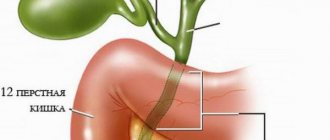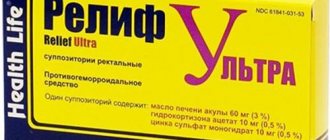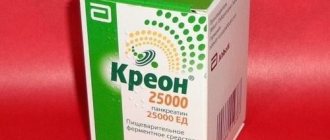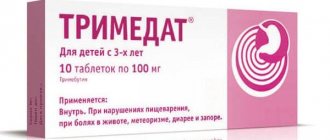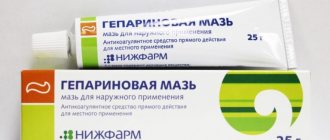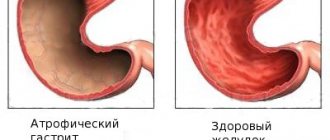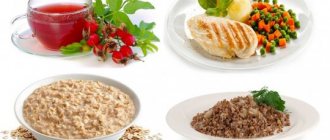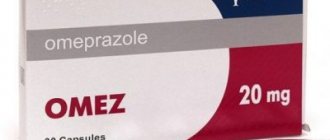Main components and principle of operation
Allochol contains natural substances: extracts of nettle, garlic, dry bile of animal origin, activated carbon.
The medicine affects the secretory function of the liver, enhances the formation and outflow of bile. At the same time, the motor ability of the gastrointestinal tract is activated.
The digestion process improves, a slight laxative effect is possible. Gas formation, fermentation, and putrefactive processes are reduced.
Pancreatin is a multienzyme agent. Contains protease, trypsin, chymotrypsin, lipase, amylase.
The main action is aimed at replenishing the deficiency of pancreatic secretion. The medicine stimulates the production of pancreatic enzymes and improves the absorption of heavy foods.
Instructions for the simultaneous use of Allochol and Pancreatin for the treatment and prevention of helminthiasis
When taking any pharmacological drug, the patient must know exactly how the drug is allowed to be used (in what dosages) and whether it can be taken in combination with other drugs.
How safe is it to use Allohol and Karsil or Allohol and Pancreatin at the same time? It is better to refrain from such experiments without risking your health, because any drug, if used incorrectly, can cause serious harm to a person.
Ailments associated with the functional abilities of the liver and biliary tract require an integrated approach to treatment.
Among the medications whose action is aimed at treating these pathological processes, choleretic drugs occupy a special place.
These medications are roughly divided into two types:
- choleretics - medications that activate the production of bile by the liver;
- cholekinetics are medications that accelerate the contraction of the gallbladder and increase the rate of secretion release into the duodenum.
But there are remedies that include both properties. These include the drug Allohol.
More information about the medication
Allochol is a herbal preparation used in gastroenterology to treat many pathological processes. The drug can eliminate the symptoms that appear when the biliary system is malfunctioning.
These symptoms include:
- bloating after eating food;
- pain under the right rib;
- bitterness in the mouth;
- nausea and vomiting.
Thanks to the extract of nettle and garlic, dry bile and activated carbon in the composition of the drug, during penetration into the body it has a positive effect on its functionality:
- improves the functioning of the gallbladder and liver;
- improves the outflow of bile secretion, which prevents its stagnation;
- increases the synthesis of bile by liver tissues;
- eliminates negative processes in the intestines (fermentation and rot);
- activates the secretory functions of the pancreas and stomach;
- has a preventive effect against the formation of cholesterol stones in the gall bladder;
- has an antispasmodic effect;
- helps with stool disorders due to its mild laxative effect;
- stops the appearance of flatulence.
In order for the drug to produce maximum effect, the patient must strictly adhere to the recommended dosage and other rules of administration.
Compatibility with other drugs
Allohol is a drug that is used not only to treat diseases. It is used for preventive purposes. This is especially true for people with chronic forms of inflammatory processes of the gallbladder. But what happens if you combine other pharmacological agents with Allochol? How will the human body react to this?
Allohol in interaction with Karsil
Allohol belongs to the group of choleretic medications, and Karsil is a hepatoprotector. If the first drug is used to increase the amount of secretion released from the gallbladder and its outflow into the intestines, then Karsil is used to improve the functionality of the liver.
Both drugs are of plant origin, which inspires consumer confidence. If necessary, their one-time use is acceptable, since these drugs do not interact with each other and are not capable of increasing the toxic effect of each other
.
However, they can be taken together only as prescribed by a doctor if the patient has problems with the functioning of the gallbladder and liver.
Allohol and Pancreatin
The use of Pancreatin improves the functioning of the digestive system. The drug compensates for the lack of enzymes formed in the pancreas. Capable of providing lipolytic, proteolytic and amylolytic effects. The medicine activates the breakdown of fats, proteins and carbohydrates in the duodenum, which contributes to their more dense absorption.
Pancreatin should be taken by those patients who have impaired functionality of the gastrointestinal tract. Simultaneous use of Pancreatin and Allochol is permissible in a complex form after individual dose adjustment by the doctor.
Festal and Allochol
The use of Festal is necessary for depressed exocrine function of the pancreas, leading to chronic pancreatitis. It is taken for pathologies of the gastrointestinal tract and liver.
Most people think that Festal is an analogue of Allochol, but this opinion is wrong. It contains pancreatin, which helps break down proteins and carbohydrates for better absorption in the small intestine.
Thanks to bovine bile in the list of active components of Festal, the medicine is classified in the group of choleretic drugs, like Allochol. The combined use of these medications is acceptable for certain ailments in the gastrointestinal tract.
Essentiale and Allochol
In fact, Essentiale is an expensive analogue of Allochol. His responsibilities include normalizing the functionality of the liver and improving the activity of its cells.
Thanks to its formula, Essentiale regenerates liver cells, thereby reducing the energy costs of the organ to carry out its activities.
Essentiale is used for cirrhosis and liver necrosis in people of any age.
The drug is able to normalize the physicochemical properties of bile secretion, like Allochol. However, Essentiale has a slightly different type of effect on the organ, which allows it to quickly restore liver function even with critical damage.
Is it possible to take these drugs at the same time if there is no need for it? It all depends on how damaged the liver is and as a result of which its functional ability is impaired.
If the problem is related to dysfunction of the biliary tract, then there is no need to buy an expensive drug, because Allochol can cope with the pathology.
But if the organ damage is serious and caused by cirrhosis, toxic exposure or other serious illness, then it is better to give preference to Essentiale.
Compatibility with Hepatrin
Hepatrin is a hepatoprotector and belongs to the group of essential phospholipids. The drug contains components that make up the liver tissue. Regular use of the medication leads to the restoration of damaged organ cell membranes. In addition, the medicine is based on natural ingredients and combines a vitamin complex necessary to support the liver.
Heparin is a dietary supplement (BAA) that is more effective as a prevention than a treatment. The drug is recommended for every resident of large cities and people working in hazardous industries to create a good level of liver protection from negative factors.
As for its compatibility with Allochol, if a certain dosage is observed, their simultaneous use is permissible, but only after a doctor’s prescription.
conclusions
If you follow the recommendations of a specialist, you can combine several medications without consequences for your body. It is important that this decision is made together with the attending physician, who, based on the individual characteristics of the patient, will be able to calculate the dosage, taking into account the benefit-risk ratio for the patient.
Source: https://ParazityCheloveka.ru/preparaty/allohol-i-pankreatin-odnovremennyj-priem.html
Indications for use
Complex therapy is used for the following diseases:
- chronic hepatitis, pancreatitis;
- dyskinesia of the gallbladder;
- initial stage of liver cirrhosis;
- cholangitis, cholecystitis;
- constipation with intestinal atony;
- cystic fibrosis;
- cholelithiasis.
This treatment is carried out before operations on the liver, gall bladder, as well as during the rehabilitation period after surgery.
Treatment of pancreatitis with Allochol and Pancreatin
The combined use of enzyme and choleretic drugs is permissible only for chronic pancreatitis. Medicinal substances improve the outflow of bile secretions, and also promote the breakdown of fats that have an irritating effect on the pancreas.
The inflammatory process is reduced, pain symptoms are reduced.
The therapeutic course takes place at intervals: after a 4-week intake there is a 12-week break.
Allohol for pancreatitis: can it be taken, will it help?
Pancreatitis is a complex disease with inflammation of the pancreas and gradual destruction of the organ. The enzymes produced by the gland do not pass into the duodenum, but remain at the site of production.
The organ begins to gradually self-digest until complete destruction.
The pancreas also releases toxic elements into the blood supply, leading to destructive malfunctions of the lungs, brain, heart, and other vital organs.
To alleviate the patient’s condition, it is necessary to improve the production of bile and the functioning of the digestive system. In order to minimize the burden on the body, it is advisable to choose a medicine based on natural substances that has these properties. A well-known natural drug is allochol.
Characteristics and beneficial properties of allochol
Allohol is a natural medicine based on dry bile, garlic and nettle extracts, and charcoal. The drug contains cholic acid, which helps restore the function of the mucous membrane in the production of bile. Garlic, having anti-inflammatory properties, helps relieve flatulence, fermentation and putrefaction.
These properties of allochol improve the flow of bile and, thereby, reduce inflammatory processes in the pancreas and slow down the formation of stones in the bile ducts. The drug has a positive effect on the liver and the patient’s digestion. When taken regularly, the medicine can reduce the pain symptoms of the disease to a minimum within a week.
Using allohol for pancreatitis, it is possible to improve the patient’s situation and alleviate the condition. The drug is allowed to be used for disorders of the liver and intestines. At an early stage, the medicine helps with liver cirrhosis, cholecystitis and cholangitis.
Features of the use of allochol for the treatment of acute and chronic pancreatitis
The use of allochol improves the functions of the pancreas, liver and intestines in a short time. The drug is extremely tempting for patients with pancreatitis. The features of using this medicine are described depending on the stage of the disease, which will have to be taken into account before starting to take allochol for pancreatitis.
Is it worth taking allohol during the acute stage of pancreatitis?
In acute pancreatitis, inactive enzymes are activated under the influence of bile and begin to aggressively affect the pancreas. As a result, inflammation occurs. Thus, choleretic drugs are contraindicated in the acute stage.
The main effect of taking allochol is choleretic. Taking this drug in the acute stage of the disease will not improve the patient’s condition, but will cause irreparable harm. In this case, the medicine is strictly contraindicated.
Features of the use of allochol for chronic pancreatitis
In case of chronic pancreatitis, the use of allochol, on the contrary, will bring enormous benefits. Treatment with the drug must be carried out under the supervision of a gastroenterologist. The medication regimen and dosage should be strictly followed to obtain maximum benefit.
In the remission stage, the duration of taking allochol varies from three weeks to a month. It is prescribed to take the drug 3-4 times a day, 2 tablets. With exacerbation of chronic pancreatitis, the course is increased to two months. In this case, the dosage is 1 tablet 2-3 times during the day. After a quarter, treatment with this drug is repeated.
For children, the duration of taking the medicine is similar. The dose size and frequency of administration depend on the age of the child. For children under 7 years of age, half the full dose is recommended (one tablet 1-3 times a day). Patients over 7 years of age are prescribed an adult regimen and dosage.
After consuming allochol, the production of hydrochloric acid in the stomach increases. If it enters an empty stomach, the acid will corrode the mucous membrane and ulcers will form. Therefore, the use of the drug is allowed only after meals. However, this does not have to be a full meal; a small amount of food is enough.
Contraindications for use and side effects from using allochol
Allohol for pancreatitis is an effective drug that improves the condition and alleviates the painful and unpleasant symptoms that accompany the disease. The medicine is well tolerated and suitable for a wide range of patients. Considering the choleretic properties of the drug, you should not take it for the following diseases:
- acute pancreatitis;
- allergy to the components of the drug;
- liver diseases – hepatitis in acute form, liver dystrophy in the acute stage;
- ulcers;
- the presence of large stones with a diameter of 1 cm or more in the bile ducts and gallbladder;
- obstructive jaundice;
- enterocolitis in the acute stage;
- cholecystitis.
As a rule, allochol is well tolerated. Sometimes the drug exhibits rare cases of adverse reactions, especially in overdose. These include: allergies, diarrhea, dyspeptic symptoms, nausea, heartburn, itching. In extremely rare cases of violation of the rules of use, exacerbations of pancreatitis and ulcers of nearby organs occur.
Simultaneous use of allochol in combination with other drugs
When using allohol for the treatment of pancreatitis, the possibility of interaction of the drug with medications taken should be taken into account. The combination of incompatible substances will cause irreparable harm to the body. At the same time, the beneficial properties of some drugs, on the contrary, are enhanced. Pay attention to the features of drug interactions:
- Use together with drugs containing aluminum hydroxide, cholestipol or cholestyramine is ineffective. These substances, reacting with beneficial acids, neutralize them.
- Use simultaneously with drugs that enhance bile production increases the positive effect of taking it.
- Simultaneous use with medications that have a laxative effect helps to get rid of long-term constipation.
- The use of allochol together with fat-soluble vitamins promotes their better absorption.
- In combination with antibiotics, the anti-inflammatory process is enhanced.
Thus, this drug can be taken with almost all known medications, with a few exceptions. Combination with many agents enhances the beneficial effects.
Possibility of drinking alcohol during treatment with allohol
The course of treatment for pancreatitis with allochol is long. The minimum is 3 weeks, reaching two months. It is clear that during this period there are holidays and memorable dates on the calendar. The question arises about the possibility of drinking alcoholic beverages during treatment.
It should be borne in mind that alcoholic drinks increase the intensity of the glands. As a result, the production of gastric juice increases. Alcohol causes the body to produce an increased amount of bile and increases bile secretion. In combination with allochol, this will lead to serious diarrhea.
Drinking alcohol-containing drinks causes spasm of the biliary sphincters. In this case, bile, which is actively produced in increased quantities, will not be able to be released. Severe pain occurs. Therefore, during treatment with allochol it is strictly not recommended to drink alcoholic beverages.
Based on the above, we note: for pancreatitis, allochol is an effective, relatively safe natural remedy. Correct use of the medicine can improve the patient's condition.
The use of the drug in the acute stage of the disease is strictly not recommended - there is a high risk of worsening the disease. It will be necessary to take into account contraindications and compatibility with other drugs. The decision to take allochol is agreed with the doctor.
Then the use of the drug will help the patient improve the quality of life.
Source: https://GastroTract.ru/bolezn/pankreatit/allohol-pri-pankreatite.html
special instructions
Medicines should not be taken on an empty stomach, since the secreted gastric juice has a detrimental effect on the mucous membrane of an empty stomach. It is important to follow the diet prescribed by your doctor.
Pregnancy and lactation
Choleretic and enzyme agents are not contraindicated for pregnant or lactating women.
They do not have a teratogenic effect on the fetus, but are used strictly according to indications.
Childhood
Children under 7 years old are given Allochol 1 tablet, older ones - 2 tablets, like adults.
In pediatrics, “Pancreatin for children” is used.
Elderly age
Elderly patients often have a lack of secretory functions, so they are prescribed complex therapy.
Compatibility of the drug with alcohol
Pancreatitis and alcohol are in themselves incompatible. One of the causes of the disease is alcoholic beverages. However, some people do not mind drinking 100 grams to relieve pain. No doctor would recommend this pain reliever.
And when performing therapy with Allochol, alcohol should be completely excluded. This is due to the fact that alcoholic drinks increase the production of gastric juice. The effect of the drug is similar, which when summing up the two effects leads to vomiting and severe stomach upset. If there was no pain in the right side, then the likelihood of their very pronounced appearance increases significantly. They can be relieved with painkillers. However, their prescription must be performed by an experienced doctor.
Diseases of the gastrointestinal tract (GIT) require a careful approach to complex treatment. Diet is considered the basis. It is the violation of nutritional rules that plays a major role in the exacerbation of chronic pathology and leads to the progression of the lesion. In case of gastrointestinal diseases, Allochol's action depends on the type of functional disruption; it is necessary to compensate for insufficient bile production in liver cells, help secretory organs, and restore fat metabolism.
The drug contains a healing herbal combination of garlic and nettle extracts, dry bile, and activated carbon. Able to influence the movement of bile through the outflow canals. The main properties allow you to eliminate stagnation in the biliary system and improve digestion. Taking the drug helps get rid of unpleasant symptoms. The rules for using Allochol are set out in the instructions; the effectiveness depends on their compliance.
Contraindications, possible side effects
Taking allochol is contraindicated in the following cases:
- Hypersensitivity to one of the components;
- Acute hepatitis;
- Acute pancreatitis;
- Calculus cholecystitis;
- Peptic ulcer;
- Acute enterocolitis;
- Obstructive jaundice;
- Acute or subacute liver dystrophy.
This choleretic drug is well tolerated by most patients and rarely has side effects. In rare cases, patients may experience signs of an allergic reaction, diarrhea, heaviness in the abdomen, or heartburn. To eliminate these unpleasant symptoms, it is enough to stop taking the drug.
- Hypersensitivity to one of the components;
- Acute hepatitis;
- Acute pancreatitis;
- Calculus cholecystitis;
- Peptic ulcer;
- Acute enterocolitis;
- Obstructive jaundice;
- Acute or subacute liver dystrophy.
During treatment with Allochol, dyspeptic symptoms (diarrhea, heartburn and bloating), as well as skin rashes, may occur.
Side effects in those suffering from pancreatitis can manifest themselves in the form of allergic reactions due to individual intolerance to individual components of the drug. Allochol has poor compatibility with alcohol, causing vomiting or diarrhea.
